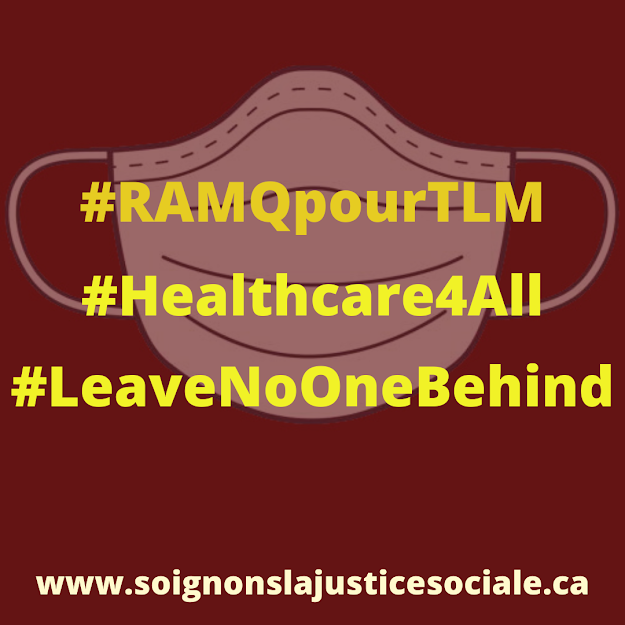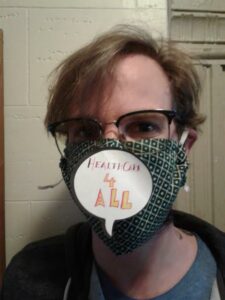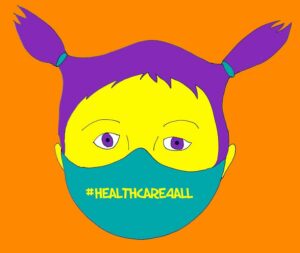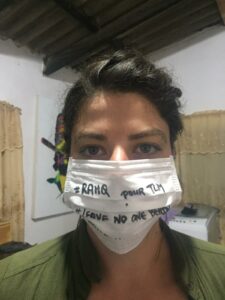
Pour la version de cette lettre en français: CLIQUEZ ICI
To sign this letter as a group or an individual: CLICK HERE
Open letter: Dignified Access to Health Care for the Medically Uninsured
Open letter by the Caring for Social Justice Collective, to the attention of:
Danielle McCann, Minister of Health and Social Services
Marguerite Blais, Minister Responsible for Seniors and Informal Caregivers.
Lionel Carmant, Minister Delegate for Health and Social Services
François Legault, Premier of Quebec
cc. Dr. Horacio Arruda, Assistant Deputy Minister, Director General of Public Health
Dre. Mylène Drouin, Regional Director of Public Health of Montreal
The Government of Quebec recently announced that screenings and health care directly related to COVID-19 will now be covered by the Quebec Health Insurance Plan (RAMQ) for all people currently residing in Quebec, including those not eligible for a RAMQ card. As caregivers and groups defending access to dignified and quality health care for all, we are indignant that other types of health care (not directly related to COVID-19) were not included in this announcement.
If this decision is motivated by a public health approach, it is quite simply doomed to fail. In fact, if the objective is to avoid new outbreaks and to flatten the transmission curve, it is essential to minimize the barriers likely to discourage symptomatic people from seeking health care. This “two-tier” approach is perpetuating a climate of fear which prevents uninsured people, who worry about being charged exorbitant amounts of money or of being deported or detained, from seeking health care. The World Health Organization has been clear on this fundamental point: to face this pandemic, no one can be left behind.
Furthermore, this policy is unenforceable and adds to the work of caregivers on the frontlines. In a context of community transmission of the virus, how can we tell if a person who presents themselves at the emergency room with respiratory symptoms has a disease “related to COVID-19 ”? The priority is to provide care, not to waste precious time and resources in unnecessary and discriminatory bureaucratic gymnastics.
Finally, what message is the government sending to the public with this policy?
Are migrants in Quebec only worthy of access to health care when they suffer from COVID-19, that is to say when “They” present a potential public health problem for “Us,” Quebecers? This discourse perpetuates the notion that migrants are a burden on the health care system, when on the contrary they form an essential pillar of our society. Many of the caregivers – whom the Premier calls “guardian angels” – currently working on the front line are migrants themselves. Not to mention that they are often the ones building our houses, looking after our children, filling the shelves in supermarkets and pharmacies, planting our fruits and vegetables, all while working in difficult and precarious conditions.
This pandemic has shed a brutal light on the flaws of our health care system, a result of decades of massive disinvestment in public health, social services and primary care. It also exacerbates existing social inequalities, making the most vulnerable and marginalized – including people without status – even more at risk of contracting COVID-19 and of dying from it.
However, it has also prompted an admirable collective solidarity, as evidenced by the numerous mutual aid initiatives constantly emerging around us. The past few weeks have shown us that our healthcare system is not an immutable bureaucratic monolith and that change is possible.
In a global context where millions of migrants are being displaced by an economic system from which we benefit, from climatic disasters to which we contribute greatly, from the political and social instability that our governments exacerbate, it is our duty to respond with responsibility and solidarity.
At a time when calls for empathy and cooperation are multiplying, we ask the Government of Quebec to listen. Why not take the example of Ontario, which announced on March 25th that all public health care services would now be insured for those not eligible for a health insurance card, regardless of whether they have COVID-19. Mr. Legault, you talk about the “moral duty” to protect the “most vulnerable”: this directive must include everyone who resides in Quebec.
We demand that the Government of Quebec and the Ministry of Health ensure RAMQ coverage of all healthcare for everyone residing in Quebec, regardless of their immigration status, immediately and definitively.
-The Caring for Social Justice Collective
http://www.soignonslajusticesociale.ca/
To sign this letter as a group or an individual: CLICK HERE
This letter has been endorsed by 286 individuals, including some representing the following groups (latest update May 17 2020):
Alliance des communautés culturelles pour l’égalité dans la santé et les services sociaux (ACCESSS)
Alliance du personnel professionnel et technique de la santé
AlterHéros
Association des groupes d’intervention en défense des droits en santé mentale du Québec (AGIDD-SMQ)
Association des intervenants en dépendance du Québec
Association étudiante en sciences infirmières du Québec (AÉSIQ)
Association multiethnique pour l’intégration des personnes handicapées
Association québécoise des organismes de coopération internationale (AQOCI)
Au coeur de l’enfance
Bridges Not Borders
Carrefour d’éducation populaire de Pointe-Saint-Charles
Centre d’action bénévole de Hull
Centre d’éducation et d’action des femmes de Montréal (CÉAF)
Centre des femmes d’ici et d’ailleurs
Centre des femmes de Longueuil
Centre des femmes solidaires et engagées
Centre ressources pour femmes de Beauport
Clinique communautaire de Pointe-Saint-Charles
Coalition des organismes communautaires québécois de lutte contre le sida (COCQ-SIDA)
Coalition solidarité santé
Collectif “Ensemble avec les personnes migrantes contre le racisme”-Sherbrooke
Collectif Opposé à la Brutalité Policiere (COBP)
Comité des femmes immigrantes de Québec
Comité pour les droits humains en Amérique latine (CDHAL)
Concertation en itinérance Beauharnois-Salaberry-Suroit
Corporation de développement communautaire solidarités Villeray
Ex aequo
Fédération des femmes du Québec (FFQ)
Fédération de la santé et des services sociaux (FSSS-CSN)
Fédération des maisons d’hébergement pour femmes
Fédération du Québec pour le planning des naissances
Fédération interprofessionnelle de la santé du Québec (FIQ)
Fédération Interprofessionnelle de la santé du Québec (FIQ) – syndicat des professionnelles en soins de Montérégie Ouest
Femmes de diverses origines/Women of Diverse Origins
Front d’action populaire en réaménagement urbain (FRAPRU)
Guineans United for Status
Head & Hands
Immigrant Workers’ Centre (IWC)
Jeunes médecins pour la santé publique (JMPSP)
Ligue des droits et libertés
McGill School of Social Work
McGill University Global Child Health Program
Médecins québécois pour le régime public (MQRP)
Moelle épinière et motricité Québec
Montréal-Nord Républik
Mouvement d’éducation populaire et d’action communautaire du Québec (MÉPACQ)
Mouvement PHAS (Personnes handicapées pour l’accès aux services)
Pavillon Marguerite de Champlain
Portail VIH/sida du Québec
Projet Accompagnement Solidarité Colombie (PASC)
Regroupement des aidantes et aidants naturels de Montréal (RAANM)
Regroupement de personnes qui exercent la profession d’intervenantes sociales au Québec (RECIFS)
Regroupement des organismes ESPACE du Québec
Regroupement des ressources alternatives en santé mentale du Québec (RRASMQ)
Regroupement intersectoriel des organismes communautaires de Montréal (RIOCM)
Regroupement québécois des intervenants et intervenantes en action communautaire en CISSS et en CIUSSS (RQIIAC)
Réseau d’action des femmes en santé et services sociaux (RAFSSS)
Réseau d’aide aux travailleuses et travailleurs migrants agricoles du Québec (RATTMAQ)
Réseau des tables régionales de groupes de femmes du Québec
Réseau des femmes des Laurentides
Réseau Québecois Action Santé femmes
SINGA Québec
Solidarity Across Borders (SAB)
Solidarités sans frontières-Sherbrooke
South Asian Women’s Community Centre (SAWCC)
Stella, l’amie de Mamie
Table de concertation groupes de femmes Bas-Saint-Laurent
Table de concertation du mouvement des femmes de la Mauricie (TCMFM)
Table des Organismes communautaires Montréalais de lutte contre le sida – TOMS
Table des regroupements provinciaux d’organismes communautaires et bénévoles (TRPOCB)
Table régionale des organismes volontaires d’éducation populaire de Montréal (TROVEP)
The Canadian Centre for Refugee and Immigrant Health Care
The Children’s Without Borders
Press review:
Le Devoir: https://www.ledevoir.com/societe/sante/577784/des-soins-factures-a-des-sans-papiers
Radio-Canada: https://ici.radio-canada.ca/nouvelle/1699395/coronavirus-soins-quebec-legault-medecins-monde-covid
CityNews: https://montreal.citynews.ca/video/2020/04/30/undocumented-migrants-in-peril-amid-covid-19/



